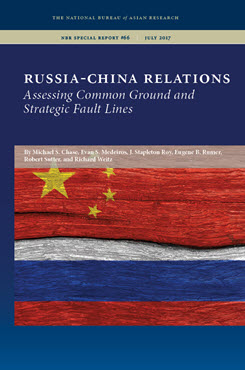Chinese Perspectives on the Sino-Russian Relationship
This essay explores Chinese perspectives on the Sino-Russian relationship and considers the implications for U.S. policy.
EXECUTIVE SUMMARY
MAIN ARGUMENT
Over the past two decades, the relationship between China and Russia has evolved from a marriage of convenience into one of enduring strategic value for both countries, one that China describes as a “comprehensive strategic partnership of coordination.” Chinese policymakers recognize the limitations of the Sino-Russian relationship and do not aspire to transform it into a formal alliance. Nonetheless, China has strong incentives to further enhance its relationship with Russia, covering economic, military, and diplomatic cooperation. Major drivers include what China perceives as the dangers of U.S. global hegemony, democracy promotion, and attempts to undermine strategic stability or otherwise threaten Chinese security interests in Asia. China also benefits from trade and investment links and energy cooperation with Russia. The sum total of these motivations is substantial, spanning Chinese perceptions, interests, and policies about global security, diplomatic, and economic affairs. China’s incentives to sustain this relationship will remain robust for the foreseeable future, while the costs for China will remain low.
POLICY IMPLICATIONS
- Gone are the days of the Cold War’s strategic triangle. Today both China and Russia view the U.S. as the main potential threat to their interests. In this context, Beijing and Moscow have a stable strategic partnership grounded in a geopolitical reality as well as numerous areas of convergence of economic, diplomatic, and security interests.
- Regardless of the trajectory of the U.S.-Russia and U.S.-China relationships, Beijing and Moscow will very likely become even closer. Additionally, broad policy incoherence or inconsistency on key issues by the Trump administration could create opportunities for China and Russia to find new and different ways to undermine the interests of the U.S. and its allies and partners.
Evan S. Medeiros is Managing Director and Practice Head for Asia at the Eurasia Group. He was formerly the Senior Director for Asia on the National Security Council.
Michael S. Chase is a Senior Political Scientist at the RAND Corporation and an Adjunct Professor at Johns Hopkins School of Advanced International Studies.


